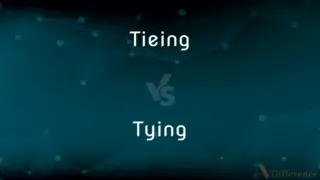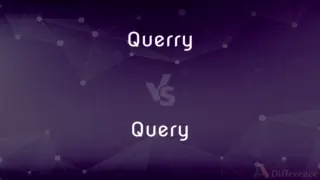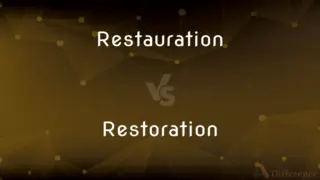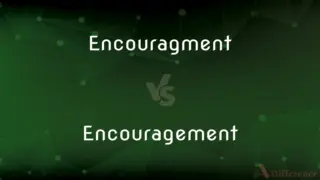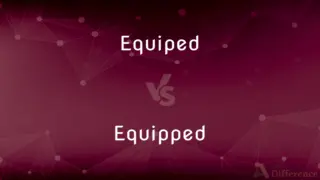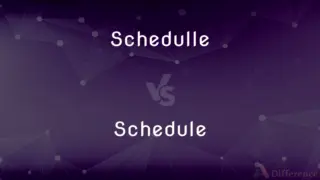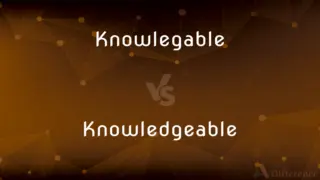Greately vs. Greatly — Which is Correct Spelling?
By Tayyaba Rehman — Updated on March 30, 2024
"Greately" is the incorrect spelling. The correct version is "Greatly," signifying to a large extent or degree.
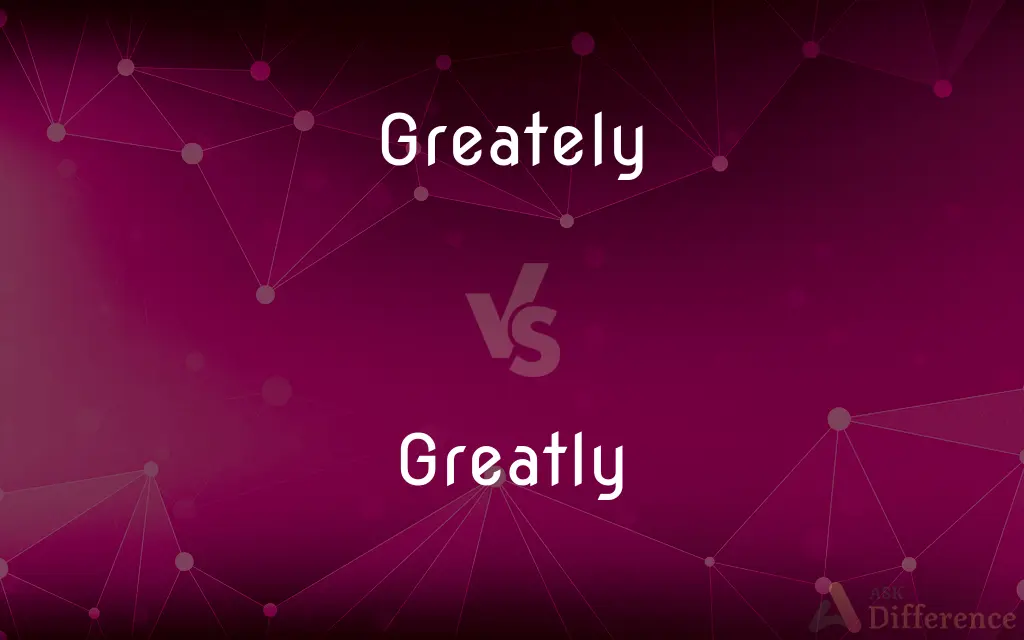
Table of Contents
Which is correct: Greately or Greatly
How to spell Greatly?

Greately
Incorrect Spelling

Greatly
Correct Spelling
ADVERTISEMENT
Key Differences
Associate "Greatly" with the base word "Great," just adding "ly."
Remember there's only one 'e' after 't' in "Greatly."
Think of "little" and "greatly" – both end with "ly."
Recall popular phrases like "I greatly appreciate it" to reinforce the correct spelling.
Envision the word "Great" and simply tag on "ly" at the end.
ADVERTISEMENT
How Do You Spell Greatly Correctly?
Incorrect: He was greately disappointed by the news.
Correct: He was greatly disappointed by the news.
Incorrect: The project has benefitted greately from her expertise.
Correct: The project has benefited greatly from her expertise.
Incorrect: She was greately influenced by her mentor.
Correct: She was greatly influenced by her mentor.
Incorrect: His work has improved greately over the year.
Correct: His work has improved greatly over the year.
Incorrect: The team's performance has greately exceeded our expectations.
Correct: The team's performance has greatly exceeded our expectations.
Greatly Definitions
Significantly or noticeably.
The project greatly benefited from his expertise.
In a profound manner.
The speech greatly moved the audience.
To a large extent or degree.
Her health has greatly improved.
To an impressive extent.
She's greatly talented in the arts.
In an eminent sense or degree.
This discovery is greatly significant to the scientific community.
Very large in size, extent, or intensity
A great pile of rubble.
A great storm.
Of a larger size than other, similar forms
The great anteater.
Large in quantity or number
A great throng awaited us.
Extensive in time or distance
A great delay.
A great way off.
Remarkable or outstanding in magnitude, degree, or extent
A great crisis.
Great anticipation.
Of outstanding significance or importance
A great work of art.
Chief or principal
The great house on the estate.
Superior in quality or character; noble
A great man who dedicated himself to helping others.
Powerful; influential
One of the great nations of the West.
Eminent; distinguished
A great leader.
Very good; first-rate
We had a great time at the dance.
Very skillful
She is great at algebra.
Enthusiastic
A great lover of music.
Being one generation removed from the relative specified. Often used in combination
A great-granddaughter.
(Archaic) Pregnant.
Pl. greats or great One that is great
A composer considered among the greats.
A division of most pipe organs, usually containing the most powerful ranks of pipes.
A similar division of other organs.
Very well
Got along great with the teacher.
Used as an intensive with certain adjectives
A great big kiss.
To a great extent or degree.
Expenses greatly exceeded revenues this year.
He was more greatly beloved than anyone in living memory.
(archaic) Nobly; magnanimously.
In a great degree; much.
I will greatly multiply thy sorrow.
Nobly; illustriously; magnanimously.
By a high fate thou greatly didst expire.
To a great extent or degree;
He improved greatly
Greatly reduced
Greatly Meaning in a Sentence
The situation has greatly affected everyone involved.
The event was greatly enjoyed by all attendees.
She was greatly admired for her courage and determination.
The team greatly respects the coach for his dedication.
His health has greatly improved since he started exercising.
The quality of life has greatly increased with technological advancements.
We are greatly concerned about the environmental impacts.
His contribution to the project has been greatly valued.
The city has changed greatly in the last decade.
The support from the community has greatly contributed to the program's success.
The research has greatly expanded our knowledge on the topic.
This discovery has greatly advanced the field of science.
Prices have greatly fluctuated in recent months.
The policy changes will greatly benefit future generations.
Public opinion has shifted greatly in the last few years.
He has greatly matured over the course of the year.
The invention has greatly simplified the process.
Their kindness has greatly touched our hearts.
The crisis has greatly impacted small businesses.
The feedback was greatly helpful in improving the project.
Their efforts have greatly enhanced our understanding of the issue.
The landscape has changed greatly due to urban development.
She greatly regrets not taking the opportunity when she had the chance.
The new law will greatly reduce pollution.
Common Curiosities
Which vowel is used before Greatly?
The indefinite article "a" can be used before "Greatly," depending on the context.
What is the plural form of Greatly?
Adverbs, including "Greatly," do not have plural forms.
Why is it called Greatly?
It's derived from the adjective "great" with the suffix "ly" to form an adverb indicating the degree or extent.
What is the verb form of Greatly?
Greatly is an adverb and doesn't have a verb form.
What is the root word of Greatly?
The root word of "Greatly" is "Great."
What is the singular form of Greatly?
Greatly does not have a singular or plural form as it is an adverb.
Is Greatly an abstract noun?
No, Greatly is not a noun, hence it cannot be an abstract noun.
What is the pronunciation of Greatly?
Greatly is pronounced as "GRAYT-lee."
Which preposition is used with Greatly?
Various prepositions can be used with "Greatly" such as "by" in "greatly by the majority."
Which article is used with Greatly?
Typically, "Greatly" does not precede articles since it's an adverb. However, context can change this.
Is Greatly a collective noun?
No, Greatly is not a collective noun.
Which conjunction is used with Greatly?
Any conjunction can be used with "Greatly" based on context, such as "and," "but," or "or."
Is Greatly a negative or positive word?
Greatly is neutral in sentiment but can be positive or negative depending on context.
What part of speech is Greatly?
Greatly is an adverb.
What is another term for Greatly?
Considerably, significantly.
What is the first form of Greatly?
Greatly doesn't have verb forms.
Is Greatly an adverb?
Yes, Greatly is an adverb.
Is the Greatly term a metaphor?
On its own, Greatly is not a metaphor, but can be used in metaphorical expressions.
How many syllables are in Greatly?
Greatly has two syllables.
What is the opposite of Greatly?
Minimally or slightly.
What is the second form of Greatly?
Again, Greatly doesn't have verb forms.
Is Greatly a countable noun?
Greatly is not a noun, so it is not countable.
Is the word Greatly is imperative?
No, Greatly is not an imperative verb.
How is Greatly used in a sentence?
I greatly appreciate your help with the project.
Is Greatly a noun or adjective?
Greatly is neither a noun nor an adjective; it's an adverb.
Is Greatly a vowel or consonant?
Greatly is a word made up of both vowels and consonants.
How do we divide Greatly into syllables?
Great-ly.
What is a stressed syllable in Greatly?
The first syllable, "Great," is stressed.
Which determiner is used with Greatly?
As an adverb, "Greatly" typically doesn't pair with determiners.
What is the third form of Greatly?
Greatly still doesn't have verb forms.
Share Your Discovery
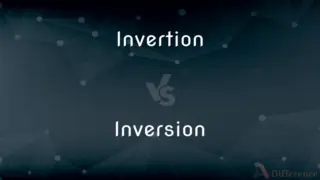
Previous Comparison
Invertion vs. Inversion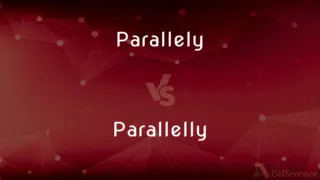
Next Comparison
Parallely vs. ParallellyAuthor Spotlight
Written by
Tayyaba RehmanTayyaba Rehman is a distinguished writer, currently serving as a primary contributor to askdifference.com. As a researcher in semantics and etymology, Tayyaba's passion for the complexity of languages and their distinctions has found a perfect home on the platform. Tayyaba delves into the intricacies of language, distinguishing between commonly confused words and phrases, thereby providing clarity for readers worldwide.

